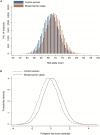Prediction of breast cancer risk based on profiling with common genetic variants
- PMID: 25855707
- PMCID: PMC4754625
- DOI: 10.1093/jnci/djv036
Prediction of breast cancer risk based on profiling with common genetic variants
Abstract
Background: Data for multiple common susceptibility alleles for breast cancer may be combined to identify women at different levels of breast cancer risk. Such stratification could guide preventive and screening strategies. However, empirical evidence for genetic risk stratification is lacking.
Methods: We investigated the value of using 77 breast cancer-associated single nucleotide polymorphisms (SNPs) for risk stratification, in a study of 33 673 breast cancer cases and 33 381 control women of European origin. We tested all possible pair-wise multiplicative interactions and constructed a 77-SNP polygenic risk score (PRS) for breast cancer overall and by estrogen receptor (ER) status. Absolute risks of breast cancer by PRS were derived from relative risk estimates and UK incidence and mortality rates.
Results: There was no strong evidence for departure from a multiplicative model for any SNP pair. Women in the highest 1% of the PRS had a three-fold increased risk of developing breast cancer compared with women in the middle quintile (odds ratio [OR] = 3.36, 95% confidence interval [CI] = 2.95 to 3.83). The ORs for ER-positive and ER-negative disease were 3.73 (95% CI = 3.24 to 4.30) and 2.80 (95% CI = 2.26 to 3.46), respectively. Lifetime risk of breast cancer for women in the lowest and highest quintiles of the PRS were 5.2% and 16.6% for a woman without family history, and 8.6% and 24.4% for a woman with a first-degree family history of breast cancer.
Conclusions: The PRS stratifies breast cancer risk in women both with and without a family history of breast cancer. The observed level of risk discrimination could inform targeted screening and prevention strategies. Further discrimination may be achievable through combining the PRS with lifestyle/environmental factors, although these were not considered in this report.
© The Author 2015. Published by Oxford University Press.
Figures




Comment in
-
Genetic screening could improve breast cancer prevention, study finds.BMJ. 2015 Apr 9;350:h1879. doi: 10.1136/bmj.h1879. BMJ. 2015. PMID: 25858913 No abstract available.
References
-
- Ferlay J, Soerjomataram I, Ervik M, et al. GLOBOCAN 2012 v1.0, Cancer Incidence and Mortality Worldwide: IARC CancerBase No. 11. Lyon, France, International Agency for Research on Cancer http://globocan.iarc.fr/ Accessed February 3, 2014.
-
- Bleyer A, Welch HG. Effect of three decades of screening mammography on breast-cancer incidence. N Engl J Med. 2012;367(21):1998–2005. - PubMed
-
- Independent UK Panel on Breast Cancer Screening. The benefits and harms of breast cancer screening: an independent review. Lancet. 2012;380(9855):1778–1786. - PubMed
-
- Howell A, Astley S, Warwick J, et al. Prevention of breast cancer in the context of a national breast screening programme. J Intern Med. 2012;271(4):321–330. - PubMed
Publication types
MeSH terms
Substances
Grants and funding
- CA54281/CA/NCI NIH HHS/United States
- CA128978/CA/NCI NIH HHS/United States
- C8197/A10123/CRUK_/Cancer Research UK/United Kingdom
- P30 CA008748/CA/NCI NIH HHS/United States
- R01CA69664/CA/NCI NIH HHS/United States
- 1U19CA148537/CA/NCI NIH HHS/United States
- UM1 CA182910/CA/NCI NIH HHS/United States
- MC_PC_14105/MRC_/Medical Research Council/United Kingdom
- CA116201/CA/NCI NIH HHS/United States
- P30 CA016056/CA/NCI NIH HHS/United States
- MR/K006215/1/MRC_/Medical Research Council/United Kingdom
- C1287/A10710/CRUK_/Cancer Research UK/United Kingdom
- 15106/CRUK_/Cancer Research UK/United Kingdom
- P01 CA087969/CA/NCI NIH HHS/United States
- UM1 CA164920/CA/NCI NIH HHS/United States
- P30 CA68485/CA/NCI NIH HHS/United States
- 16565/CRUK_/Cancer Research UK/United Kingdom
- P30 CA016056-32/CA/NCI NIH HHS/United States
- R01 CA092447/CA/NCI NIH HHS/United States
- R01CA47305/CA/NCI NIH HHS/United States
- CA122340/CA/NCI NIH HHS/United States
- G0700491/MRC_/Medical Research Council/United Kingdom
- R01 CA100374/CA/NCI NIH HHS/United States
- CA63464/CA/NCI NIH HHS/United States
- C490/A10124/CRUK_/Cancer Research UK/United Kingdom
- C1287/A12014/CRUK_/Cancer Research UK/United Kingdom
- P01 CA87969/CA/NCI NIH HHS/United States
- 16563/CRUK_/Cancer Research UK/United Kingdom
- CRN-87521/CAPMC/ CIHR/Canada
- 1U19CA148065/CA/NCI NIH HHS/United States
- C8620/A8372/CRUK_/Cancer Research UK/United Kingdom
- P30 CA068485/CA/NCI NIH HHS/United States
- R01 CA77398/CA/NCI NIH HHS/United States
- K05 CA152715/CA/NCI NIH HHS/United States
- CA132839/CA/NCI NIH HHS/United States
- CA-58860/CA/NCI NIH HHS/United States
- CA098758/CA/NCI NIH HHS/United States
- C8620/A8857/CRUK_/Cancer Research UK/United Kingdom
- C1287/A10118/CRUK_/Cancer Research UK/United Kingdom
- R01 CA47147/CA/NCI NIH HHS/United States
- 16561/CRUK_/Cancer Research UK/United Kingdom
- 10124/CRUK_/Cancer Research UK/United Kingdom
LinkOut - more resources
Full Text Sources
Other Literature Sources
Medical
Molecular Biology Databases

